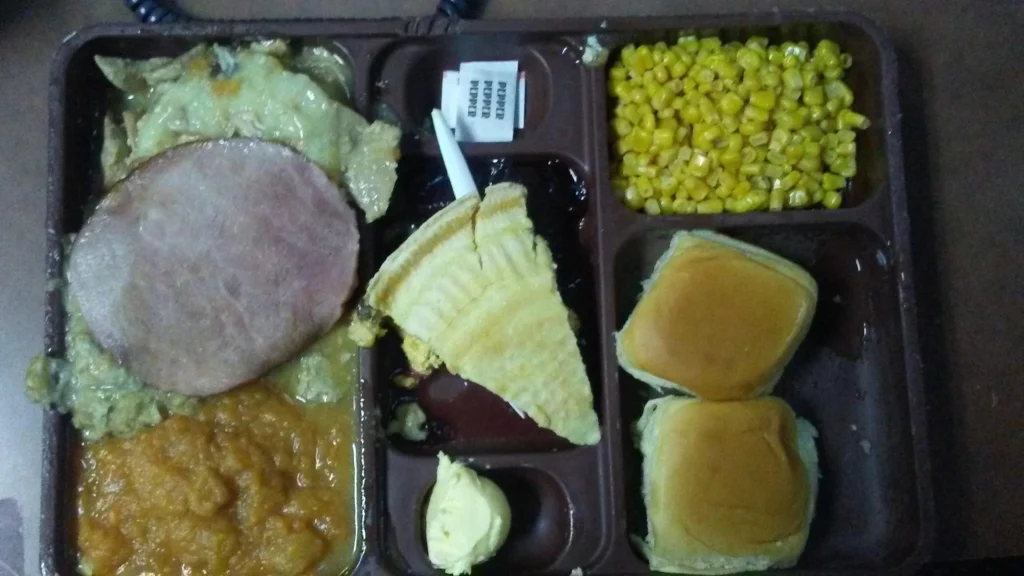This post is in part adapted from our Voices Unlocked podcast on holidays in prison. To hear Larry Wayne LaFleur read his poem, in his own voice, listen to or watch the podcast.
A lot of us love this time of year, because there’s a whole bunch of holidays sort of close together: Halloween, Thanksgiving, Christmas and then New Year’s. And on top of that, there are birthdays and other lesser-known holidays. Even if you don’t celebrate the holidays themselves, it’s time off work.
But what do holidays mean to people in prison? To answer that question, one of the people I interviewed is Larry Wayne LaFleur, who is 35 years into a life sentence. Currently incarcerated at the Sheridan medium-security federal prison in Oregon, Larry makes the point that to understand the meaning – or lack of meaning – of holidays in prison, it’s important to know the context of the person. This excerpt from a poem written by Larry reflects his:
Life in Degrees

Slowly becoming numb.
Basketball, weight pile, handball
only fill time.
The work, the hobbies,
none of it quiets the mind.
Days turn into weeks
and weeks turn into years.
The first decade in.
Death: parents, friends, grandparents.
Birth: life and new kin.
People stop writing,
meaningful contact is slim.
The first 15 years in.
If not for the horrible dreams,
would I know why I’m here.
I’ve taken all the classes,
stayed sober and clean.
Every single day is the same routine.
Feel lost and forgotten.
The second decade in.
(For his compete poem, read Larry’s story.)
Holidays for ‘lifers’
Larry makes the point that the significance of holidays, particularly New Year’s, depends on how long a person’s sentence is.
“I have a lot of guys around me who are excited for the new year because it means they are closer to home,” he tells me. “They get really excited about it, and I would too. I’d definitely be excited for the new year if I knew I was going home soon. But for people who have a long time, holidays are nothing to celebrate. For myself, with a life sentence, they mark just another year staying where I am. And honestly, the quicker they’re over the better, because as the holiday season comes around, the depression level and people’s moods go way haywire. And it makes it a little bit tougher to deal with individuals. People just get grouchier.”
Fortunately, Larry has family support. Larry has a very loving, committed wife and five grandchildren – a network that a lot of people in prison don’t have. So, for him, the little pleasure he gets during the holidays is in the form of letters, calls and – if the prison isn’t on lockdown – visits. The federal system, however, has evolved to make letters a little less personal.
You’ve got mail!
“I’ve been in prison since 1989. And when I came in, we got ‘real’ mail. They opened it up and gave it to us – including greeting and birthday cards that included crayon drawings and stuff like that,” recalls Larry. “But what made those cards memorable for me was not really their content. It was the fragrance. People don’t realize that in prison, you lose a lot of your senses, because you’re constantly around steel and concrete. There are no perfumes and colognes. And so, when the mail came and you could smell it before it got to your door, it was a refreshing feeling, a piece of the outside world. You know, it put you mentally in somebody’s department store.”
Then, about two years ago, that changed.
“They started giving us only photocopies of our mail – and they now won’t copy greeting cards at all,” he says. “They said it was to stop drugs from coming into the institution. And that has changed the holidays drastically for most of the men in here. Holidays in prison aren’t easy to begin with, and handmade Christmas cards and such were a little bit of a lifeline. And they took that away.”
According to the Prison Policy Institute, scanning personal mail that may be sprayed with liquified drugs is increasingly common across federal and state prisons. However, says the PPI, “there’s no solid evidence to date that mail scanning will stem the flow of contraband.” Analyses in Pennsylvania and Missouri suggest that mail scanning has little to no effect on the frequency of overdoses and drug use in prisons. And the widespread use of scanning distracts from the reality that correctional staff are a major source of contraband in prisons, as the PPI found in a 2018 survey).
The institute goes on to note that incarcerated people re-read their mail over and over as a reminder of their support on the outside. Scanned mail, however, is often low-quality or incomplete. Unlike in Europe, American prison officials seem to look only at the risk side of the equation rather than the benefit – a very short-term point of view.
The PPI goes on to note that some prison systems, such as Florida’s, scan mail and upload it into a digital database, where it’s then viewable on a tablet or a shared kiosk inside a prison. In other words, no physical mail is delivered at all.
“I think that would be even worse,” says Larry. “As you know, I have five grandbabies. And even though I only get photocopies of their letters, I cherish them so much I keep them all in my small cell locker, especially during the holidays. Those hand-drawn turkeys and pumpkins in the leaves are really special to me. If they do switch to just images on a tablet, that would take away any long-lasting joy I can get out of that.”
Indeed, a new bill has been introduced by Rep. Don Bacon (R-Neb.), requiring the director of the Bureau of Prisons to develop a strategy to scan all mail coming into federal correctional facilities. However, perhaps learning from the mental health research, it would require that staff provide prisoners the original mail within 30 days if it’s drug-free.
Comfort food
One aspect of prison life that is a little better during the holidays is the food.
Ray Dodd, who served 25 years in federal prison, says most people wake up on a holiday at least knowing they’ll get a better meal.
“Now, by that I don’t mean something that people on the outside would think of as a better meal,” explains Ray. “Rather, it’s like you get turkey or a Cornish hen instead of bologna and cheese. You get a slice of pie and maybe some eggnog.”

However, there are ways for prisoners to concoct their own holiday foods from commissary items or purloined kitchen food. And Cordell Miller, who was released about a year ago after an incarceration of about 30 years, says that very often, they also created their own family spirit.
“We knew there were guys who didn’t get visits or calls from family so we became their family. To be honest, we often were better than family to each other. It was often more genuine, more real. We all shared the same adverse situation and circumstances, so we understood. So, we’d collectively prepare a special meal the day before, to create a Christmas-like atmosphere,” he recalls.
He almost fondly describes one year: “I remember when I was in D Block of USP Lee (Virginia) for the Christmas holidays. We had about a hundred guys on the block and we took the commissary list, and assigned each and every individual three to five items, depending on their financial stability. And the guys who worked in the kitchen, they might contribute some food from there, like raw meat, cheese and rice. We didn’t have microwaves anymore, so we used what we called a stinger, which is something we concocted by cutting a cord with a plug and touching the wires to a piece of metal, then sticking it all in a bucket full of water and bringing it to a boil. Or we’d fry foods with a bucket full of grease. The most memorable meals for me were macaroni and cheese, potato salad, fried chicken and cheesecake. Guys even made wine out of fruit.”
[Want to try “prison cheesecake”? Cream cheese isn’t usually available, so they do this: For the crust, graham cracker crumbs are mixed with margarine smuggled out of the dining hall. The filling is made from a round of laughing cow cheese wedges, smashed up and mixed with a vanilla pudding cup, a container of Cremora non-dairy creamer, and the juice from a plastic squeeze lemon. Once thoroughly mixed and beaten until stiff, the filling is poured into the crust and set atop a bucket of ice to chill until set.]
How to share the holidays with a prisoner
So, knowing all of the complexities of life in prison, what should one say to an incarcerated friend or loved one? “Happy holidays” seems inappropriate.
“Don’t not acknowledge the holidays,” says Larry. “Just be yourself. Don’t be fake. Just show you care; even though they might not let you know that it touches them, it really does. Because that’s what guys want; they want to know that they are seen, that you’re thinking of them.”




